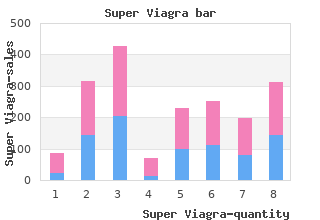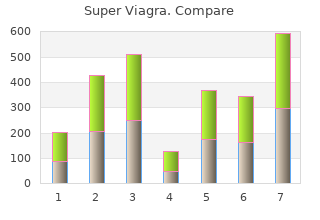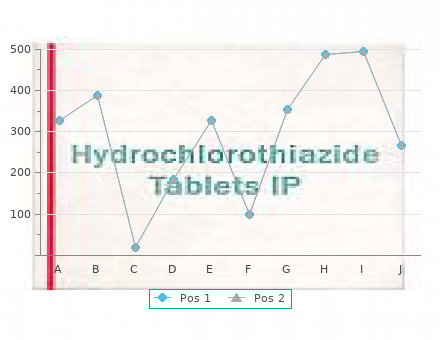|
Super Viagra
By I. Giacomo. Summit University of Louisiana.
Unaffected co-twins have a similar head size super viagra 160mg discount erectile dysfunction 23 years old, suggesting macrocephaly may represent an endophenotype (Froehlich et al buy super viagra 160mg free shipping erectile dysfunction caused by vicodin, 2013). Advanced paternal age is reported to be associated with childhood autism in offspring (Lampi et al. Autistic children prefer objects to faces, they avoid eye contact and have difficulty learning to engage in social interaction. This may be apparent in the first few months of life. These children appear to prefer being alone and seldom seek comfort from others. Autistic children have been described as lacking a “theory of mind” (see Chapter 33), by which is meant they are unable to understand the world from the perspective of others. If they know where something is which is out of sight (lost car keys) they assume that everyone knows the location of that thing. They prefer predictable routines and familiar environments. If overwhelmed by change or adversity they may respond with anger, self-injury or withdrawal. There are difficulties in sensory integration, and such people may have difficulty tolerating normal sensory input. People with autism tend to be clumsy, have poor body awareness and difficulty learning new movements. There are often delays in speech, language and motor skills. Such people may remain mute throughout life, communicating using images, sign language or typing. Some develop large vocabularies but nevertheless have difficulty sustaining a conversation. Social situations are usually highly stressful for people with autism. However, companionship is important to them, and they are often conscious of being outcasts and this is distressing rather than desired. Autistic people often engage in self-stimulation, which is observed by others as repetitive behaviours, such as spinning objects. They may flap their hands or arms or wiggle their toes for long periods. They often arrange toys in rows rather than play with them in the usual manner. They may become preoccupied with certain subjects, such as computers, numbers, symbols or particular aspects of science. Eduction presents difficulties, as could be expected from the above. Difficulty understanding gestures leads to difficulty understanding and communicating with teachers and peers. Autistic savants are autistic people with extraordinary talent in a certain area. There is controversy regarding the best ways of treating people with autism. It celebrates the work of Hans Asperger (Austrian; 1906-1980) who had described the condition decades earlier. As he travelled little and published in German, his work was late to be “discovered”. They are at greater risk of depression or poverty than members of the general population. These are social difficulties and stereotyped behavioural features, but there is not delayed and deviant language development.


These profound ongoing shifts in the wider context were very much borne in mind by the members of the research team as they progressed with the task of finding answers to the original set of research questions buy 160mg super viagra otc vasculogenic erectile dysfunction causes. Research questions The overall aim was to assess and clarify the extent buy 160 mg super viagra with amex erectile dysfunction drugs online, nature and effectiveness of clinical engagement and leadership in the work of the CCGs. This was broken down into five main research questions. What is the range of clinical engagement and clinical leadership modes being used in CCGs? What is the extent and nature of the scope for clinical leadership and engagement in service redesign that is possible and facilitated by commissioning bodies, particularly the CCGs and the health and well-being boards (HWBs)? What is the range of benefits being targeted through different kinds of clinical engagement and leadership? What are the forces and factors that serve either to enable or block the achievement of benefits in different contexts, and how appropriate are different kinds of clinical engagement and leadership for achieving effective service design? What can be learned from international practices of clinical leadership in service redesign in complex systems that will be of theoretical and practical value to CCGs and HWBs? The case studies and the national surveys were used as means to generate relevant data to help answer these questions. Before we present the findings and our interpretations of those findings, it is necessary to: (a) summarise the state of knowledge about these questions as found in the existing literature (b) introduce the theoretical lens we used in undertaking the analysis found in later chapters (c) describe the research methods which we deployed in this study. In seeking to answer the research questions we were of course aware that there were existing literatures relevant to aspects of the research agenda, most notably literatures concerning the policy context, previous initiatives prompting GP commissioning, clinical leadership more broadly and service redesign in health. Hence, before describing our research methods we now turn to an outline review of those literatures. This issue may be freely reproduced for the purposes of private research and study and extracts (or indeed, the full report) may be included in professional journals 3 provided that suitable acknowledgement is made and the reproduction is not associated with any form of advertising. Applications for commercial reproduction should be addressed to: NIHR Journals Library, National Institute for Health Research, Evaluation, Trials and Studies Coordinating Centre, Alpha House, University of Southampton Science Park, Southampton SO16 7NS, UK. The predominant perceived challenges during the course of this study (2013–16) was the fragmented health and social care system and the severe financial constraints. The nature and scale of the challenges facing the NHS have been spelled out many times,8 and there have been many warnings about the non-sustainability of business as usual. In this environment, the ambitious transformation plans which usually require funding may be hampered by lack of money. Failures in the joining up of fragmented services are widely seen as having an impact on care of the frail elderly in particular. A common theme has been a call for a new focus on prevention, more self-care, integrated health and social care and more home-based care. This expressed the policy intent of an apparent devolution of power and accountability. The CCGs could be seen as the institutional expression of the policy thrust which put challenge, competition, choice and commissioning to the fore. However, following the departure of Secretary of State for Health, Andrew Lansley, in 2012, the emphasis shifted. Local commissioning runs alongside more regional planning. Among other things, this means that interpretation of the role of clinical leadership in CCGs, and indeed interpretations of the role of CCGs themselves, need to take account of multiple shifts in the wider landscape of health and social care. These STPs are intended to provide the local planning basis for moving towards the models for integrated service delivery outlined in the Five Year Forward View. Many CCGs now work closely with their neighbouring CCGs and some share an accountable officer and other members of a managerial team. The Health and Social Care Act 20122 and the surrounding policies and initiatives set the scene for much of the debate. This raised, and explored, many of the issues which are now being worked through in practice by the CCGs and their surrounding bodies. It is clear that at that time of inception, CCGs were seen as the critical instrument and agency for driving change. NHSE gave further guidance relating to clinical leadership: Chairs, Accountable Officers, Chief Executives and Medical Directors from across the organisations involved in a service reconfiguration should exercise collective and personal leadership and accountability when considering the development of proposals for major service change.


If clinical evidence of neurologic tion should be repeated every 6 months until the cell count involvement is observed (e discount super viagra 160mg mastercard erectile dysfunction viagra does not work. Follow-up CSF examinations also can be used to or sensory defcits generic super viagra 160 mg on line erectile dysfunction aids, ophthalmic or auditory symptoms, cranial evaluate changes in the CSF-VDRL or CSF protein after nerve palsies, and symptoms or signs of meningitis), a CSF therapy; however, changes in these two parameters occur more examination should be performed. Te leukocyte count is a sensitive are associated with neurosyphilis and should be managed measure of the efectiveness of therapy. If the cell count has not according to the treatment recommendations for neurosyphilis. Te magnitude of these risks is not defned precisely, of CSF parameters (220). No treatment regimens for syphilis have been demonstrated to be more efective in preventing neurosyphilis Management of Sex Partners in HIV-infected patients than the syphilis regimens recom- See General Principles, Management of Sex Partners. Special Considerations Primary and Secondary Syphilis Among HIV- Penicillin Allergy Infected Persons Limited data suggest that ceftriaxone 2 g daily either IM or IV for 10–14 days can be used as an alternative treatment for Treatment patients with neurosyphilis (221,222). However, the possibil- Treatment of primary and secondary syphilis among HIV- ity of cross-reactivity between ceftriaxone and penicillin exists. Terefore, if concern exists regarding Available data demonstrate that additional doses of ben- the safety of ceftriaxone for a patient with neurosyphilis, skin zathine penicillin G, amoxicillin, or other antibiotics in early testing should be performed (if available) to confrm penicillin syphilis do not result in enhanced efcacy, regardless of HIV allergy and, if necessary, desensitization in consultation with status (208). Other Management Considerations Pregnancy Most HIV-infected persons respond appropriately to stan- Pregnant patients who are allergic to penicillin should be dard benzathine penicillin for primary and secondary syphilis. Several studies Syphilis Among HIV-Infected Persons have demonstrated that among persons infected with both HIV and syphilis, clinical and CSF abnormalities consistent Diagnostic Considerations with neurosyphilis are associated with a CD4 count of ≤350 Although they are uncommon, unusual serologic responses cells/mL and/or an RPR titer of ≥1:32 (204,225,226); however, have been observed among HIV-infected persons who have unless neurologic symptoms are present, CSF examination syphilis. Most reports have involved serologic titers that were in this setting has not been associated with improved clinical higher than expected, but false-negative serologic test results outcomes. Regardless, both treponemal and nontrepone- might improve clinical outcomes in HIV-infected persons with mal serologic tests for syphilis can be interpreted in the usual syphilis (220,227,228). When clinical fndings are suggestive of syphilis but sero- HIV-infected persons should be evaluated clinically and logic tests are nonreactive or their interpretation is unclear, serologically for treatment failure at 3, 6, 9, 12, and 24 months alternative tests (e. HIV-infected persons who meet the criteria for treatment Neurosyphilis should be considered in the diferential diagnosis failure (i. CSF exami- Compared with HIV-negative patients, HIV-positive nation and retreatment also should be strongly considered patients who have early syphilis might be at increased risk for for persons whose nontreponemal test titers do not decrease 34 MMWR December 17, 2010 fourfold within 6–12 months of therapy. If CSF examination months the nontreponemal titer does not decline fourfold, is normal, treatment with benzathine penicillin G administered CSF examination should be strongly considered and treatment as 2. Management of Sex Partners Management of Sex Partners See General Principles, Management of Sex Partners. Special Considerations Special Considerations Penicillin Allergy. Te efcacy of alternative nonpenicillin Penicillin Allergy. HIV-infected, penicillin-allergic patients regimens in HIV-infected persons has not been well studied. Patients with penicillin allergy whose com- treated with penicillin (see Management of Patients Who pliance with therapy or follow-up cannot be ensured should Have a History of Penicillin Allergy). Tese therapies should be desensitized and treated with penicillin (see Management be used only in conjunction with close serologic and clinical of Patients Who Have a History of Penicillin Allergy). Limited clinical studies, along with biologic and use of alternatives to penicillin has not been well studied in pharmacologic evidence, suggest that ceftriaxone might be HIV-infected patients. Tese therapies should be used only in efective (229,230). However, the optimal dose and duration conjunction with close serologic and clinical follow-up. Latent Syphilis Among HIV-Infected Persons neurosyphilis Among HIV-Infected Persons Treatment Treatment HIV-infected persons with latent syphilis should be treated HIV-infected patients with neurosyphilis should be treated according to the stage-specifc recommendations for HIV- according to the recommendations for HIV-negative patients negative persons. If CSF pleocytosis was present initially, a CSF examina- • Treatment of late latent syphilis or syphilis of unknown tion should be repeated every 6 months until the cell count duration among HIV-infected persons is benzathine is normal. Follow-up CSF examinations also can be used to penicillin G, at weekly doses of 2. If the cell count has not decreased after 6 All HIV-infected persons with syphilis and neurologic months or if the CSF is not normal after 2 years, retreatment symptoms should undergo immediate CSF examination.
Super Viagra
9 of 10 - Review by I. Giacomo
Votes: 249 votes
Total customer reviews: 249
|

